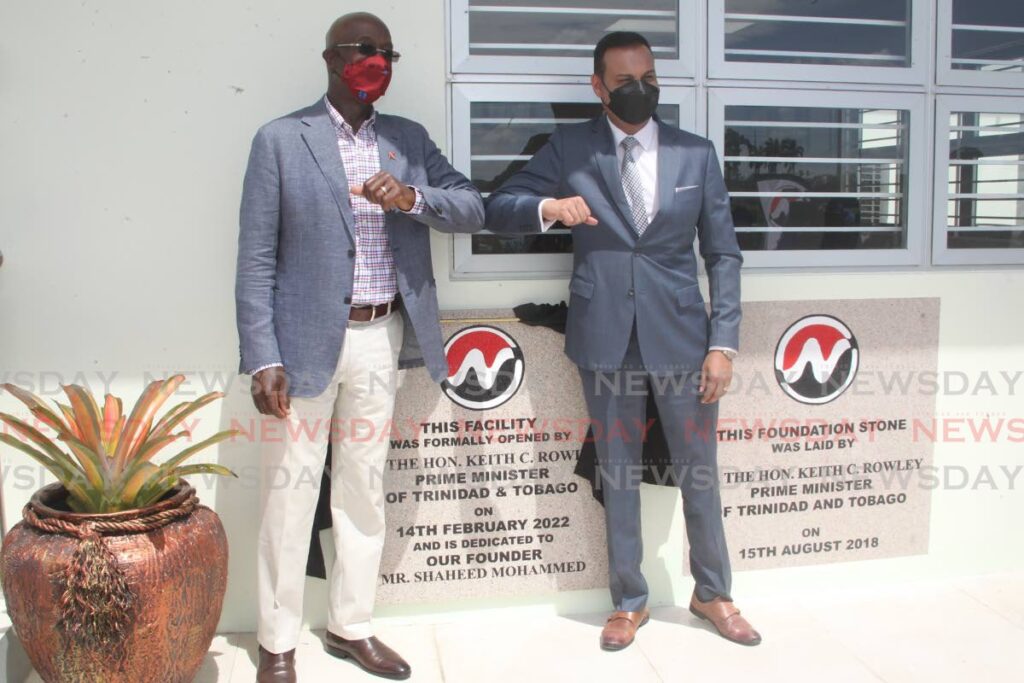Nutrimix CEO: Local producers can meet country's demand for chicken

CEO of the Nutrimix Group of companies, Ronnie Mohammed has fulfilled the dream of his late father, Shaheed Mohammed, who conceptualised the next-generation state-of-the-art hatchery which was opened on Monday at Couva.
Mohammed said the $60.2 million hatchery, the most modern in the Caribbean and Central America was constructed and is operating without a drop of water from WASA which it applied and paid for since August 2016.
“All the water used during the construction period had to be trucked in at exorbitant cost to us. And this trucking of water continues up to today, notwithstanding a public main which idly sits outside our gate. We might as well have been building our facility in a desert.”
Mohammed explained that at the heart of the plant is a fully integrated computerised system that manages the hatching process appropriately called “The Maestro."
He said, “As the name implies, the Maestro orchestrates and monitors the entire process, from the placement of eggs for hatching up to the delivery of chicks for dispatching to our contract farmers.”
Mohammed promised, “This is the latest and not last investment of this scale to be made by Nutrimix.
“As a group, we are essentially in the business of producing products that are considered staple and therefore essential to the nation’s food security and the daily needs of all citizens.”
Of the $60.2 million investment, $50.5 million accounted for local content of goods and services such as paints, cement, blocks, doors, windows, electrical wires and panels and lighting.
“We focused on reducing the outflow of foreign exchange and keeping locals employed in these challenging times.
He said his company wants to continue saving the country from using its foreign exchange for chicken importation.
Nutrimix accounts for 35 per cent of what is produced locally and together with other local producers, Mohammed said they can satisfy the local market.
“However, despite us making this known to the authorities, there is still some US$20 million of the product being imported annually, most of which are below the quality and standard we produce locally. “
He told the Prime Minister who was joined by Trade Minister Paula Gopee-Scoon and Agriculture Minister Clarence Rambharat for the ribbon-cutting ceremony, that some of these imports enter the country by way of known unethical trading practices that contravene local health laws and international harmonised commodity description and coding system.
“They are illegal because they enter the country by misclassifying these codes and items descriptors that do not exist.
“We in the local poultry industry have continuously submitted evidence of this to the local authorities and pleaded with the Chief Veterinary Office and Ministry of Trade and Industry to, among other things, have certificates of origin and the HS Codes inserted on permits granted for the importation of all chicken products.
"We are still waiting on these measures to be implemented.”
Gopee-Scoon noted his concern and assured that the Government and, by extension, the ministries of Trade and Industry and Agriculture, Land and Fisheries have been working alongside the Poultry Association of Trinidad and Tobago (PATT) to address the issue at the regional level.
She said the matter was previously raised at the tenth meeting of the Customs Committee of the Council for Trade and Economic Development (COTED) in December 2021, considered and the Customs Committee is to report back to COTED on its findings and recommendations.
At the wider level, Caricom member states are currently undertaking a comprehensive review of the Common External Tariff (CET) and Rules of Origin with the aim of modernising the regional trade in goods regime to reflect the current productive realities of the region.
Gopee-Scoon said, “One of the main purposes of the CET is to remove barriers to intra-regional trade and promote and support the production of goods within Caricom. The comprehensive review of the CET and Rules of Origin will also consider appropriate measures to safeguard sensitive production within the establishment of a new tariff structure.”
To this end, she said her ministry had developed a provisional prioritised list of items to be investigated for the possible increase of the CET with recommendations to Caricom for collective consideration.
“Significant disruptions in international trade on account of covid19, have highlighted the need for us to become more self-sufficient, particularly in the production of essential goods. “

Comments
"Nutrimix CEO: Local producers can meet country's demand for chicken"